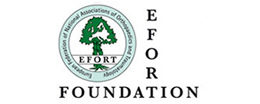The 14th Congress of the European Federation of National Associations of Orthopaedics and Traumatology (EFORT) takes place this year in Istanbul, from June 5 to 8. A city of growing prominence, with a magnificent history and rapidly developing economy, is the ideal location for a congress dedicated to a particularly dynamic field. Appropriately for such a setting, the programme offers impressive highlights.
The 14th Congress of the European Federation of National Associations of Orthopaedics and Traumatology (EFORT) takes place this year in Istanbul, from June 5 to 8. It is the most important scientific event for orthopaedists and trauma surgeons at European level.In putting together the programme, EFORT had much to choose from.
More than 4,000 abstracts were submitted, with approximately half of these passing the selection process. 600 papers will be presented in lectures and oral presentations, the rest to be presented and discussed in poster sessions.
The subjects to be dealt with at this year’s congress go beyond the field of orthopaedics and touch on collaboration with other specialties. “One of the scientific focal points this year is the subject of hemophilia in relation to orthopaedic-surgical and traumatological issues,” says the Chairman of the EFORT Scientific Committee, Prof Dr Enric Caceres (Hospital Universitari Vall d`Hebron, Barcelona). Prof Caceres says another highlight of the Congress, an issue encountered often in daily practice, will be the important area of treatment of infected fractures. “Infection, and the question of how to avoid it, is of great significance for every orthopaedic surgeon, regardless of his or her specific specialisation,” says EFORT President Prof Dr Pierre Hoffmeyer (Hôpitaux Universitaires de Genève). Prof Hoffmeyer also draws attention to lectures on the latest developments in hip and knee replacement: “The courses in which we deal with these subjects are practically booked out.”
A number of lectures will also be given by renowned international experts on injuries to the spine. Prof Hoffmeyer says a focus on paediatrics is also planned, dealing with the treatment of femur fractures and malignant bone tumours in children.
Evidence-based medicine in orthopaedics
Another area of special emphasis will be evidence-based medicine in orthopaedics. This is of great interest in that the approach used in other specialisations, in which clinical conclusions are derived primarily from randomised controlled drug studies, cannot be applied directly to orthopaedics. One of the sessions will deal with metatarsalgia. Another session will focus on the standard treatment of spinal metastases. In the course of the conference, sessions will also be held to help those preparing for the EBOT Examination, set by the European Board of Orthopaedics and Traumatology.
In general, much attention will be paid to the subject of further education and advanced training. Prof Hoffmeyer: “We know that participants particularly appreciate presentations in the form of courses and so have put special emphasis on this aspect of the Congress. Sessions involving discussions on especially difficult cases also belong in this area.”
With the newly introduced “Interactive Experts Exchange” sessions, participants are also given the opportunity to exchange experiences with renowned experts. Plenary sessions will also take up areas that are less often addressed. For instance, spinal surgery specialist Prof Dr Jean Dubousset will offer his reflections on balance and posture and their impact on his view of the treatment of various orthopaedic diseases. As guest societies, this year the Latin American SLAOT (Federation of Latin American Societies) and the Brasilian SBOT (Brazilian Society of Traumatology and Orthopaedics), holding their own sessions, will augment the EFORT Congress. The location on the border between Europe and Asia is also reflected.
“We have seen in recent years a steadily growing interest from Asian colleagues in our congress with 600 participants from Japan, China and other east Asian countries in 2010,” says Prof Caceres. “This year there will be significantly more.” The distinguished Japanese spinal surgeon and pioneer of numerous surgical techniques, Prof Katsuro Tomita from Kanazawa University, will deliver a lecture in one of the plenary sessions.
Generally, the EFORT Congress is expected to be well-attended. “The house will be rather full,” says Prof Hoffmeyer. “Compared to last year, we already had twice as many confirmed registrations by mid-February. And from experience, many colleagues register only at the last moment. So I think we may be on the way to a new record in attendance.”


